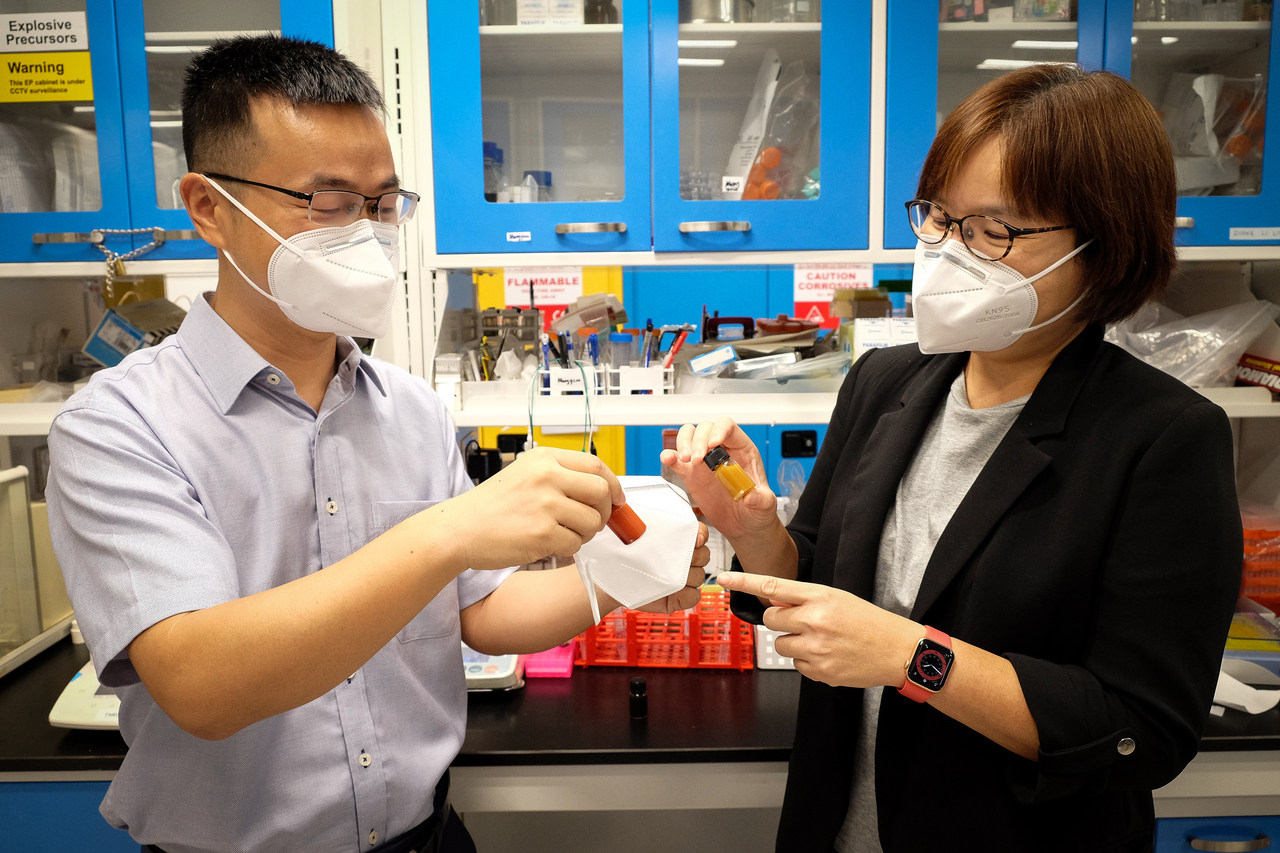NTU scientists develop reusable mask that filters 99.9% of bacteria, viruses and haze


SINGAPORE - Scientists from the Nanyang Technological University (NTU) have developed a reusable mask that is able to kill bacteria droplets within 45 seconds and filter 99.9 per cent of bacteria, viruses and haze particles - better than the medical-grade N95 masks used in hospitals.
N95 masks are able to prevent around 95 per cent of aerosolised droplets and particulate matter of around 0.3 microns in size from entering them.
The filter of the NTU-developed mask is coated with a layer of copper oxide nanoparticles, which damage the DNA of important cell structures in the bacteria, causing them to die, said Professor Lam Yeng Ming, chair of NTU's School of Materials Science and Engineering, who developed the antimicrobial coating.
To ensure these microbes remain trapped on the filter, Associate Professor Liu Zheng managed to integrate electrostatic materials to the fabric filter made from polypropylene, so that particles, including bacteria and viruses, with a negative or positive charge can be attracted to it.
To test the efficacy of this, experiments were conducted in collaboration with scientists from the National University of Singapore, where multi-drug resistant bacteria that were sprayed in droplet form onto the fabric surface were killed in 45 seconds.
Asked if the copper oxide nanoparticles are also able to kill viruses such as the Sars-CoV-2 virus which causes Covid-19, the team said various peer-reviewed studies have shown that these coatings can reduce surface transmission of the virus, though they had not experimented with it.
For instance, in a study conducted by The University of Hong Kong and Virginia Tech in the United States, door handles coated with a layer of copper oxide material had shown that the infectivity of the Covid-19 virus was reduced by 99.8 per cent in 30 minutes and 99.9 per cent in an hour.
[[nid:509651]]
The NTU team tested their nanoparticle coating by washing it in soap water at 45 deg C for 120 washing cycles, and found that there was almost no copper loss, posing little risk of toxicity to humans.
The nanoparticles are also bonded to the fibres within the mask, so there is no contact with human skin.
With these properties integrated into the mask prototype, Prof Lam said that the mask is well-equipped to protect one from Covid-19.
With the electrostatic fabric integrated into the mask's filter, its filtration efficiency is higher compared with mask filters made purely of polypropylene, which typically have a bacterial filtration efficiency of 95 per cent, like surgical masks, said Prof Liu.
[embed]https://youtu.be/JQ1OVAN7LpQ[/embed]
In comparison, the NTU-developed mask has a bacterial filtration efficiency of 99.9 per cent, meaning that it is able to prevent 99.9 per cent of bacteria-containing respiratory droplets that are around three microns in size from escaping.
A cough typically expels droplets that are between five and 20 microns in size.
At the same time, the mask is also able to prevent 99.9 per cent of aerosolised droplets and particulate matter that are around 0.3 microns in size from entering it.
Therefore, the mask's filtration efficiency surpasses that of an N95 mask but allows the wearer to breathe more easily, since it contains only a single filter, said Prof Liu.
Comparatively, N95 masks may contain multiple layers of filters to trap the haze and smoke particles, which make breathing more difficult, he added.

The Ministry of Health has advised that people wear masks of at least 95 per cent bacterial filtration efficiency, in the light of a rise in community cases and there being more infectious variants in circulation.
The antimicrobial coating is found to be effective for at least six days, and the mask can be washed and reused for over 10 times without affecting its efficacy rate, said Prof Lam.
[[nid:501587]]
However, more tests have to be done to determine the maximum reusability of the mask before its antimicrobial and filtration efficiencies are affected.
The antimicrobial coating has a patent filed through NTU's enterprise and innovation company, NTUitive, and Prof Lam's team is already working with a local company, Sportiv Tech Lab, for its reusable face mask.
In addition, the electrostatic fabric material is now used by an overseas manufacturer to make N95 masks, so they are as easy to breathe in as disposable surgical masks. These are now available commercially.
The team is hoping to work with local industry partners who are keen to license and scale up the production of their mask.
This article was first published in The Straits Times. Permission required for reproduction.